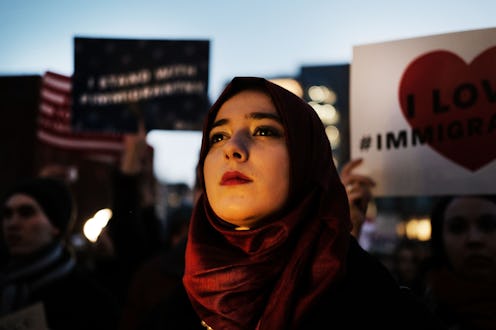News
“Punish A Muslim Day” Only Highlights What Muslims In The U.S. Already Go Through

A group of people thought they were real clever when they came up with "Punish a Muslim Day." It's a made-up "holiday" on April 3, where points are assigned to various cruel acts against people of Muslim faith. But in actuality, a lot of people have pointed out that "Punish a Muslim Day" only highlights what Muslims experience in the U.S. on a regular basis.
Several weeks ago, an anonymous group sent out fliers throughout the United Kingdom that read, "Punish a Muslim Day." The fear of the "holiday" made its way into the United States as well. According to Bklyner, the letter stated, "They have hurt you, they have made loved ones suffer. What are you going to do about it?" The flier also included a list of violent acts, ranging from verbal abuse to murder, along with a point system.
While this is truly disturbing, a lot of Muslims have pointed out that "Punish a Muslim Day" feels no different from any other day of the week for them. Even after the "holiday" passes, Islamophobia will still run rampant in the United States and abroad.
Since 2012, there have been at least 600 anti-Muslim incidents that have taken place in the United States, according to non-partisan think tank New America. And according to the FBI's hate crime report for 2016, hate crimes targeting Muslims doubled over the course of the last two years.
Participants in "Punish a Muslim Day" would get 10 fictional "points" if they verbally abuse a Muslim and 25 if they "pull the head-scarf off a Muslim 'woman.'" From there, the acts get much more violent. Fifty points are allotted for people who throw acid in a Muslim's face. Five hundred points are granted if you "butcher a Muslim using [a] gun, knife, vehicle or otherwise.” And, finally, 2,500 points is awarded to the person who decides to "nuke Mecca."
A lot of Muslims have made jokes out of this day, considering how far-fetched the idea is of someone nuking Mecca for a made-up game. "The [point] scale makes no sense at all," The Daily Show’s Hasan Minhaj joked. When talking about what these points actually mean, Minhaj said, "Is there just like a racist Chuck E. Cheese where you can cash them in for a finger trap and a tiny slinky?"
But jokes aside, many Muslim people have pointed out that just one day of Islamophobia would be nice compared to 365 days. According to the report by New America, the greatest spike in anti-Muslim incidents occurred in 2015, a year before the most recent U.S. presidential election (even more than the amount of attacks in 2001, following 9/11). This indicates that "political rhetoric from national leaders has a real and measurable impact,” Robert McKenzie, a senior fellow at New America and director of the anti-Muslim incidents project, said in the report.
In the first month after Donald Trump — whose campaign was full of anti-Muslim rhetoric, including saying he wanted to ban Muslims from the country and that "Islam hates us" — was elected president of the United States, there were more than 860 incidents of hate crimes, according to the FBI's report. This includes acts against Muslims.
In 2016, there were several reports of Muslim people being beaten outside mosques. Last summer, a 17-year-old Muslim girl, Nabra Hassanen, was assaulted and murdered after leaving her mosque in Virginia. Several mosques were burned down throughout the country last year as well. Most recently, a man was caught on film punching a Muslim woman in the head at a Michigan hospital.
While "Punish a Muslim Day" might be the butt of jokes, it's definitely not a laughing matter. The list of offenses on the flier are just a glimpse into some of the daily horrors faced by Muslim people all over the country.